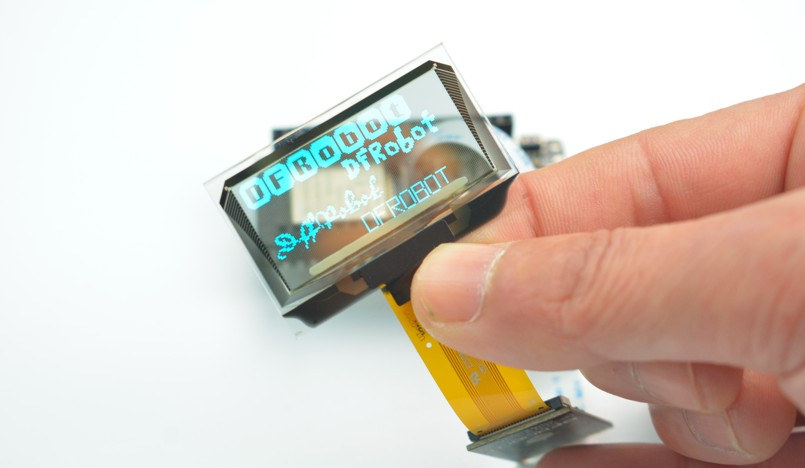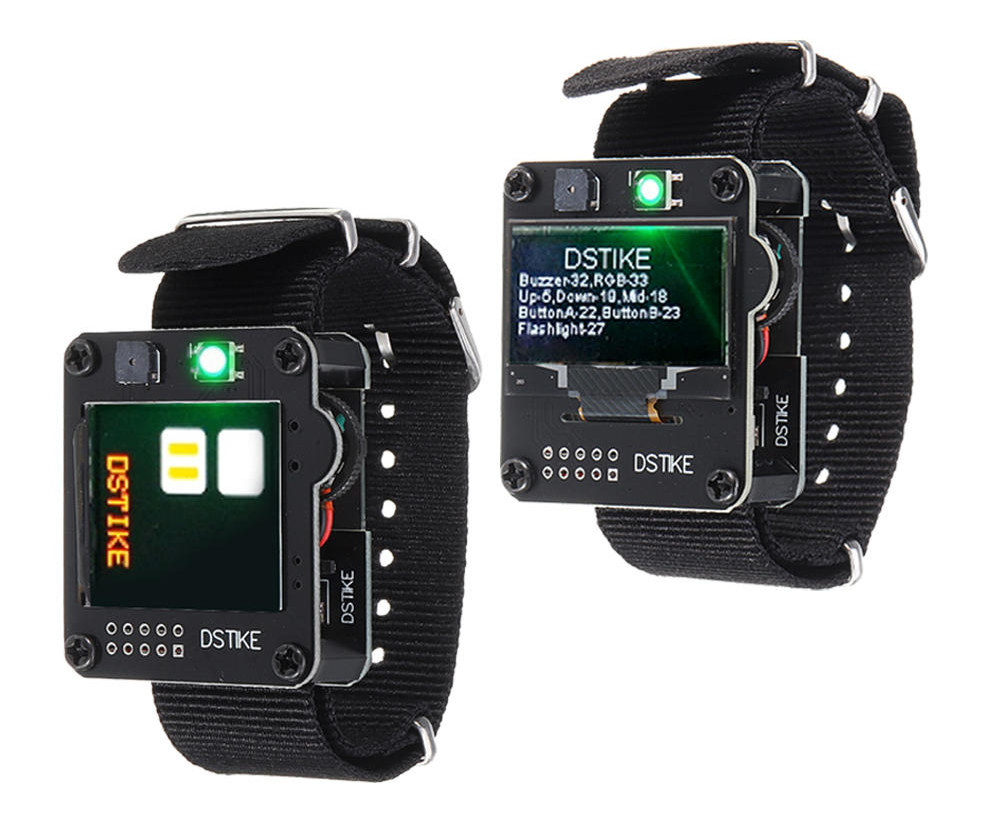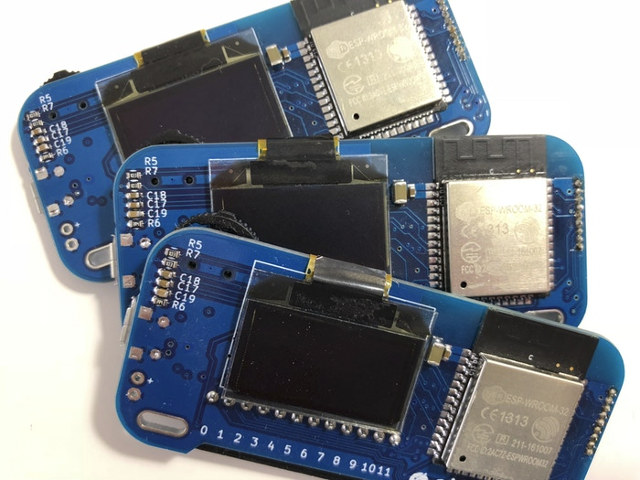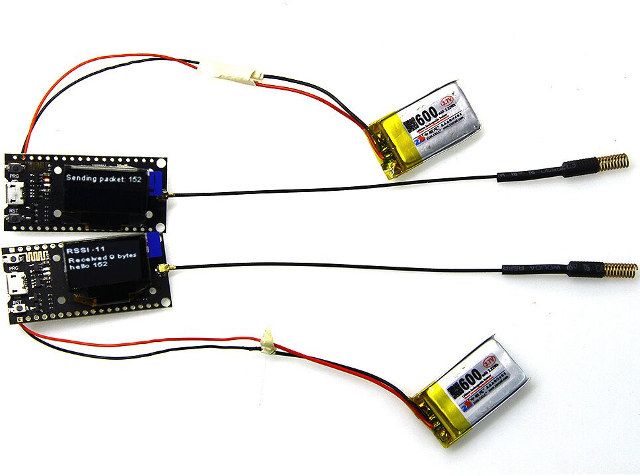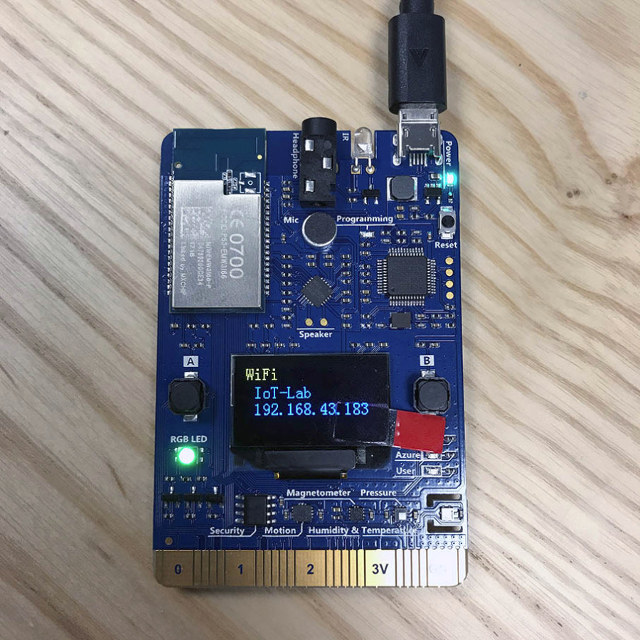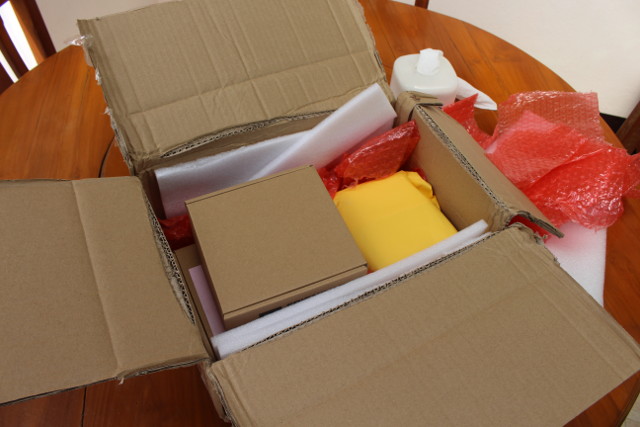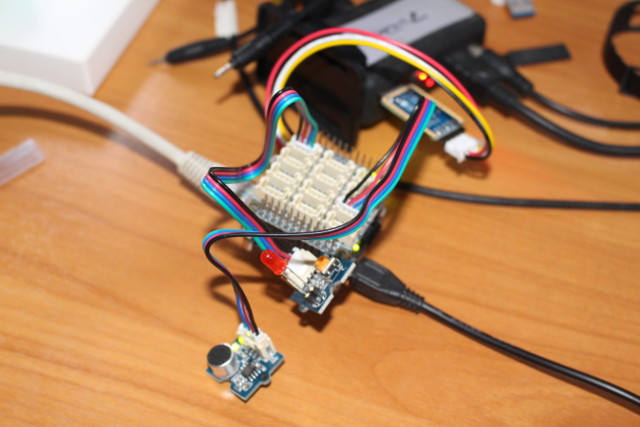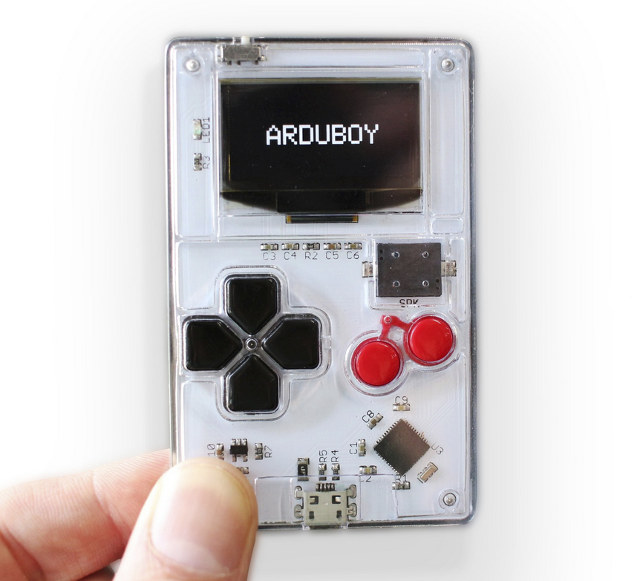We’ve seen transparent, see-through displays at least since 2010 for retail applications, and over the years, these types of transparent displays or variants have made it to consumer devices like smartwatches and notch-free smartphones. But I don’t think I had ever seen transparent displays for the maker market, and DFRobot Fermion is 1.51-inch transparent OLED display with 128×64 resolution that is connected to the host MCU via SPI or GDI (General Display Interface) interface. Fermion specifications: 1.51-inch transparent OLED display with blue pixels based on SSD1309 driver Resolution – 128×64 (transparent part: 128×56) Display interface – 8-bit 68xx/80xx Parallel, 3-/4-wire SPI, I2C Adapter Interface – SPI, GDI Operating Voltage – 3.3V Dimensions Screen Size – 41.92 x 27.08mm Display Area – 35.05 x 15.32 mm Pixel Pitch – 0.274 x 0.274mm Pixel Size – 0.254 x 0.254mm Adapter Size – 18 x 28mm/0.71 x 1.10inch Temperature Range – -40~70°C There […]
DSTIKE ESP32 Watch Development Board Comes with OLED or TFT Display
In recent months several Espressif ESP32 watches have started to show up including TTGO-T wristband and Watchy with an e-Ink display. This morning, I’ve come across another option with DSTIKE ESP32 watch development kit that offers a choice of black & white OLED display or color TFT display, and has apparently been around for about a year. DSTIKE ESP32 watch devkit specifications: SoC – ESP32 dual-core Tensilica LX6 processor with Wi-Fi 4 and Bluetooth 5.0/5.1 connectivity Storage – MicroSD card Display (one or the other) 1.3 OLED I2C display (SH1106) TFT color display with 240 x 240 resolution (I2C + 2 I/O) Expansion – 10-pin header with TX/RX, GPIO 17 & 16 (I2C), SVP/SVN, GPIO 25 & 26 (DAC), GND, and 3V Misc – Power switch, navigation buttons, reset & flash buttons, buzzer, WS2812b RGB LED, “highlight LED” (backlight LED maybe), charging status LED Battery – 600 mAh battery Dimensions […]
Obniz ESP32 Board is Programmable in JavaScript from the Cloud (Crowdfunding)
ESP32 WiFi / Bluetooth boards are now commonly supported by the Arduino IDE, and alternative firmwares are also available to program them using JavaScript (e.g. Espruino), or MicroPython. But if are familiar with JavaScript / Node.js, and don’t want to flash your own firmware, Obniz board could be an option. The board exposes 12 I/Os programmable from the company’s Cloud service, and features a OLED display used to show your program information, or a QR code to easily program the board from your smartphone’s browse once a WiFi connection has been setup. Obniz hardware specifications: Wireless Module – ESP-WROOM-ESP32 based on ESP32 dual core 802.11 b/n/g WiFi + Bluetooth LE WiSoC Display – 128×64 OLED display I/Os 12x I/O pins each configurable as GPIO, ADC, UART, SPI or I2C (no specialized pin, each can handle those functions) Up to 1A drive per I/O to control motors 3.3 or 5V selectable […]
This TTGO Board Combines ESP32, LoRa Radio, and OLED Display for just $10
Just one year ago, it would cost around $15 to $20+ to get an ESP32 board, that is if you were lucky/fast enough to order one one before it went out of stock. Since then, availability is no longer an issue, and you now can get an ESP32 development board for as low as about $7, or even around $4 during promotions. Today, I was made aware of another board sold under the “TTGO” brand, that includes not only ESP32 WiFi and Bluetooth SoC, but also a (433 MHz) LoRa radio, and an OLED display. Price? Just $10 plus shipping ($1.75 here). TTGO ESP32/LoRa board specifications: WiSoC – Espressif ESP32 Storage – 32MB on-board flash (or maybe just 16MB?) LoRa Semtech SX1278 with u.FL connector + 433MHz antenna (N.B.: Antenna must be connected during use or the Semtech chip could be damaged) Sensitivity” ~ -148dBm; output power: +20dBm Display – […]
MXCHIP AZ3166 IoT Developer Kit is Designed to Work with Microsoft Azure
MXCHIP is a Shanghai based company designing and manufacturing WiFi IoT modules such as EMW3165, which has now made a development board based on their EMW3166 STM32+ Cypress module – called MXChip AZ3166 – specifically designed for Microsoft Azure cloud computing platform. MXChip AZ3166 board specifications: Wireless Module – EMW3166 WiFi module with STM32F412 ARM Cortex M4F MCU @ 100 MHz with 256KB SRAM,1MB+2MB SPI Flash, Cypress BCM43362 WiFi chip Display – 128×64 OLED display Audio – Audio codec, built-in microphone, and 3.5mm heaphone jack Sensors – Motion sensor, magnetometer, atmospheric pressure sensor, temperature and humidity sensor Expansion – Finger extension interface with 25 external I/O pins including GPIOs, I2C, I2S, UART, ADC, Reset, 3.3V, and GND Debugging – DAP Link emulator USB – 1x Micro USB port for power, programming, debugging Misc – 2x user buttons; 1x RGB light; 3x working status indicator; IR emitter; Security encryption chip Power Supply […]
FriendlyELEC Mailbag: NanoPi NEO OLED Starter Kit, NEO Station NS-120B, and NanoPi K2 Multimedia Kit
FriendlyELEC will send me some review samples from time to time, and normally I just ask for one item, but they aways send a bunch of their products instead. This time I asked for a NanoPi NEO NAS Kit v1.2 to play with, but I got clearly more than what I asked for… Let’s start with the box at the top. It contains “NanoPi NEO complete starter kit” selling for $29.99for $29.00 with the following items: NanoPi NEO board NanoHat OLED Heatsink and thermal pad kit Akuminum housing a Mico USB cable A micro SD card pre-loaded with NEO OLED Ubuntu firmware. Three buttons, and screws It’s actually not fully complete, as you’d need to provide and solder your own male headers to NanoPi NEO board. I did not have time for soldering that day, but the final results should be really neat based on pictures from their website. If […]
Using GPIOs on NanoPi NEO 2 Board with BakeBit Starter Kit
NanoPi NEO 2 is a tiny 64-bit ARM development board powered by Allwinner H5 processor. FriendlyELEC sent me a couple of NEO 2 samples together with their BakeBit Start Kit with a NanoHat and various modules via GPIOs, analog input or I2C. I’ve already tested both Armbian with Linux 4.11 and Ubuntu Core Qt with Linux 3.10, and ran a few benchmarks on NanoPi NEO 2. You would normally prefer to use the Armbian image with Linux mainline since it provided better performance, but at the time I was told GPIO support was not there. Configuring NanoPi NEO 2 board with BakeBit library So this week-end, when I decided to test GPIO support and BakeBit Starter Kit, I decided to follow this advice, especially nanopi-neo2-ubuntu-core-qte-sd4g-20170329.img.zip image is still the recommended one in the Wiki. So I went with that image. I’ll use Python examples from Bakebit library, but if you […]
ArduBoy Arduino Compatible Portable Game Console Sells for $39
Ardubox feels like the little brother of PocketCHIP portable & hackable game console with its transparent case, but instead of running Linux on a 32-bit ARM processor, Ardubox is based on the same Atmel ATmega32u4 MCU used in Arduino Leonardo & Micro boards. Arduboy specifications: MCU – Atmel ATmega32u4 AVR MCU with 32KB flash, 2.5KB RAM, and 1KB EEPROM Display – 128×64 1-bit OLED display USB – 1x micro USB 2.0 port for power and programming User Inputs – 6x momentary tactile buttons Audio – 2 channel Piezo Speaker Misc – 1x LED Battery – 180 mAh Thin-Film Li-Po battery good for over 8 hours Beside the Arduino IDE, The board can also be programmed with Codebender, GCC & AVRDude. There’s also a fairly long list of games to play with, and it can be hacked as a virtual business card, a USB mouse and keyboard, a synthesizer, and more. […]


